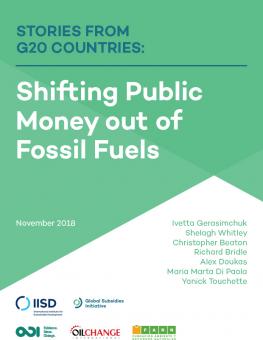
Stories from G20 Countries: Shifting public money out of fossil fuels
This analysis has brought together examples illustrating how G20 countries can learn from each other and align the flows of public money with climate targets and the Sustainable Development Goals.
Energy subsidies and tax revenues, investments by state-owned enterprises (SOEs) as well as credit support through state-owned banks and international finance institutions represent flows of public money that can either undermine or encourage sustainable development and decarbonization.
Some G20 governments have made progress in shifting at least some support away from fossil fuels and increasing their taxation. This working paper has brought together examples illustrating how reforms can be enabled and implemented to align the flows of public money with the Paris Agreement and SDGs:
- Story 1 provides the example of Indonesia as a country that saved USD 15.6 billion by reforming untargeted subsidies for gasoline and diesel in 2015.
- Stories 2 and 3 highlight recent reforms removing subsidies for fossil fuel exploration, development and production in Canada and Argentina (Spanish version).
- Story 4 features reforms in the European Union, including progress in its accountability on fossil fuel subsidies and the phase-out of subsidies for hard coal mining by the end of 2018.
- Story 5 unpacks the progress on shifting credit support from public financial institutions, including multilateral development banks, away from fossil fuels.
- Story 6 deals with the examples of SOEs in coal mining and fossil fuel power diversification in clean energy in China, India and Sweden.
- Stories 7 and 8 discuss a related issue of not just removing government support from fossil fuels, but also increasing taxation on their consumption and production, for instance in China, Saudi Arabia, South Africa and India.
This nascent positive shift of public money from fossil fuels to clean energy must occur at a much faster rate for the G20 to get on track to meeting the SDGs and climate goals. The working paper concludes with recommendations to the G20 countries for learning from each others' efforts undertaking reforms while protecting vulnerable groups and ensuring a just transition for workers and communities currently dependent on fossil fuels.
Additional downloads
You might also be interested in
The Cost of Fossil Fuel Reliance
Government support for fossil fuels reached at least USD 1.5 trillion in 2023, new data shows.
Increased Support Needed to Achieve India's Clean Energy Goals
India is on track to achieve many of its 2030 clean energy goals but needs to step up government support measures to accelerate the deployment of offshore wind, electric vehicles, and green hydrogen, according to a new report.
Ending Export Credits for Oil and Gas: How OECD countries can end 2024 with a climate win
For a year now, Organisation of Petroleum Exporting Countries (OECD) governments have been negotiating an agreement that could put an end to oil and gas export finance. Following the acrimony in Baku, this would be a very real way for the OECD to show policy coherence, respond to calls from the poorest countries to stop subsidizing fossil fuels, and shift public finance to solutions.
Fossil Fuel Production, Renewable Energy, and Subsidy Reform in Nationally Determined Contributions 3.0
This policy brief provides an analysis of the critical benchmarks and recommendations necessary for aligning nationally determined contributions (NDCs) with the 1.5 °C target.